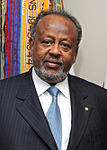| ||||||||||||||||||||||||||||
All 65 seats in the National Assembly 33 seats needed for a majority | ||||||||||||||||||||||||||||
|---|---|---|---|---|---|---|---|---|---|---|---|---|---|---|---|---|---|---|---|---|---|---|---|---|---|---|---|---|
| Registered | 194,169 | |||||||||||||||||||||||||||
| Turnout | 63.83% ( | |||||||||||||||||||||||||||
| ||||||||||||||||||||||||||||
 Results by region | ||||||||||||||||||||||||||||
| ||||||||||||||||||||||||||||
 |
|---|
| |
Parliamentary elections were held in Djibouti on 23 February 2018. [1] The election was boycotted by the main opposition parties, including some of the parties in the Union for National Salvation coalition, which had won 10 seats in the previous elections in 2013. [2]
Contents
According to government figures, the ruling Union for the Presidential Majority won 57 of 65 seats in Parliament. The opposition Union for Democracy and Justice–Djibouti Party for Development (UDJ–PDD) won seven seats in Djibouti city electoral district. The UMP ran unopposed in three electoral districts (Dikhil, Obock and Arta, 18 seats). [3]


